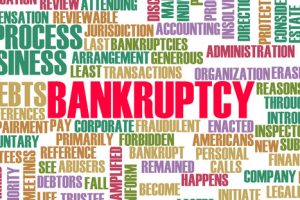What Happens During Bankruptcy?

Trilogy Capital Management, one of the last holdout creditors in the ongoing Caesar’s Entertainment Corp. bankruptcy, agreed to support the reorganization plan. This development is good news for the newly-christened Caesars Entertainment Operating Company Inc., because it will probably allow the company to emerge from Chapter 11 and return to business as usual.
In Chapter 11, the objective is not to begin again at the starting line but rather return the company to its prior profitability, largely by shedding excess debt and restructuring unfavorable contracts. Consumer bankruptcies are different, because both Chapter 7 and Chapter 13 are designed to give debtors fresh financial starts. To be frank, the events between the initial consultation and the six month discharge anniversary largely determine whether the bankruptcy is a “success” or a “failure.”
Pre-Filing Events
The 2005 bankruptcy reforms introduced a few new pre-filing wrinkles, but for the most part, the hurdles are not very high.
All consumer debtors must undergo pre-filing debt counselling. Most people have already been to debt counselling with Consumer Credit Counselling Services or some other similar group, but most lawyers ask debtors to undergo online counselling as well. That is because the bankruptcy trustee (person who oversees the bankruptcy on behalf of the judge) is used to seeing online completion certificates, and the smoother the initial document review goes, the better the outcome for the debtor. In most cases, online debt counselling costs less than $30 and takes less than thirty minutes.
Ten years ago, there was considerable angst over the means test, and some pundits predicted that the new requirement would effectively end liquidation bankruptcies. Essentially, to file Chapter 7, the debtors (or joint debtors) must have an annual income below the regional average. The amount varies by region and changes about every three or six months, but as of November 1, 2016, the cutoffs in Illinois are $50,133 for single filers and $90,080 for families of four. These are only presumptive amounts, because it is more expensive to live in Chicago than in Vienna, Illinois.
Post-Filing Events
All consumer bankruptcies feature a Creditors Meeting, which is oddly named because the only participants are the debtor, debtor’s lawyer, and trustee. This meeting is sometimes called the “341,” after the section in the Bankruptcy Code that created it. The trustee always wants to see a picture ID and proof of Social Security number, which nearly always means a driver’s license and Social Security card. The trustee normally wants financial documents as well, such as the last three years of income tax returns.
Debtors must also complete a second round of debt counselling. In Chapter 7s, this second class is normally completed online as well; in Chapter 13s, the trustee’s office often holds free live seminars.
Post-Discharge Events
The discharge order is the fresh start, and whether the debtors move forward or not is entirely up to them. As mentioned earlier, if debtors change their financial habits as necessary, stay current on their secured debts, and begin rebuilding credit with credit cards, they are very well-positioned to take full advantage of the unique opportunity that bankruptcy provides.
Contact Aggressive Lawyers
At the Bentz Holguin Law Firm, LLC, we make the entire process as easy as possible through knowledgeable representation and open communication. For prompt assistance from an experienced bankruptcy lawyer in Chicago, contact us today.
Resource:
reuters.com/article/caesars-bankruptcy-idUSL1N1CV1UM
